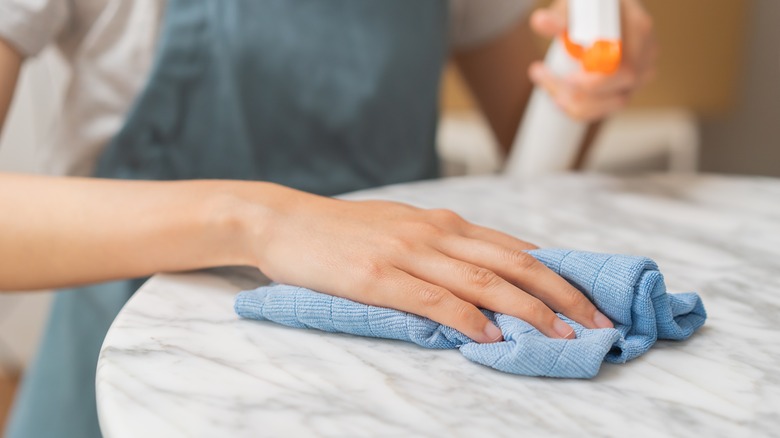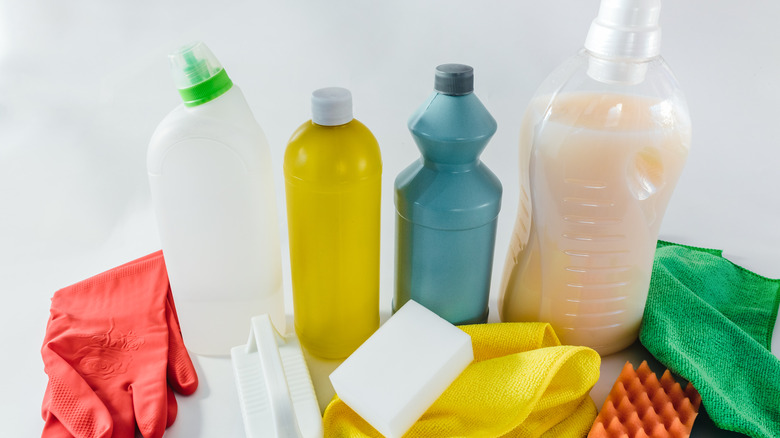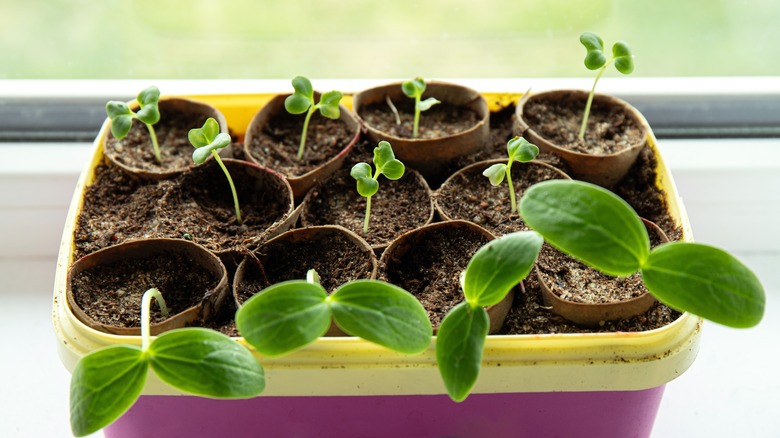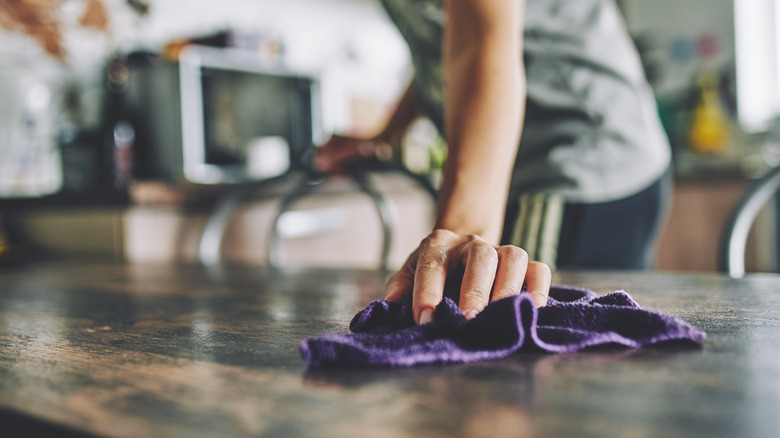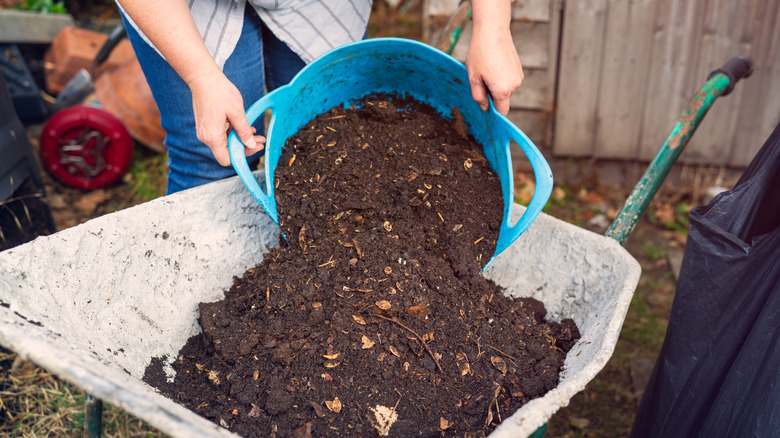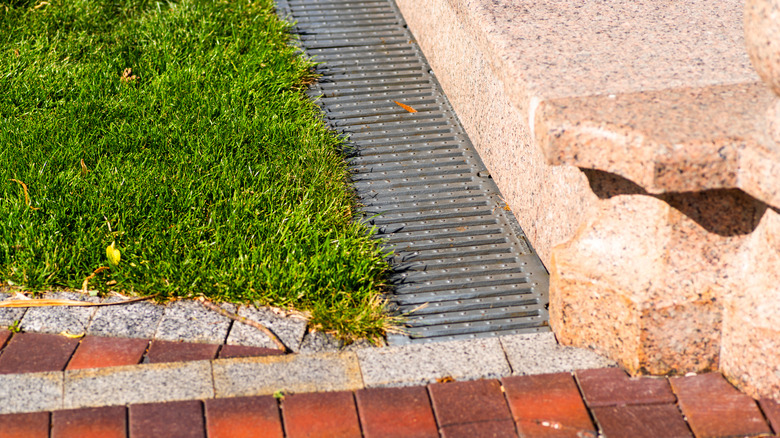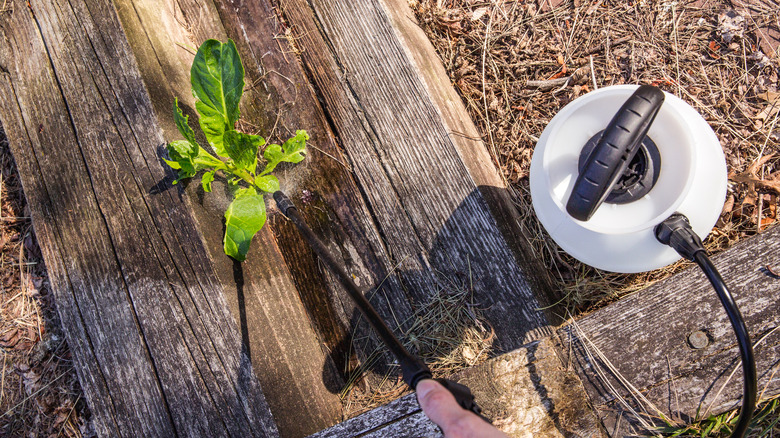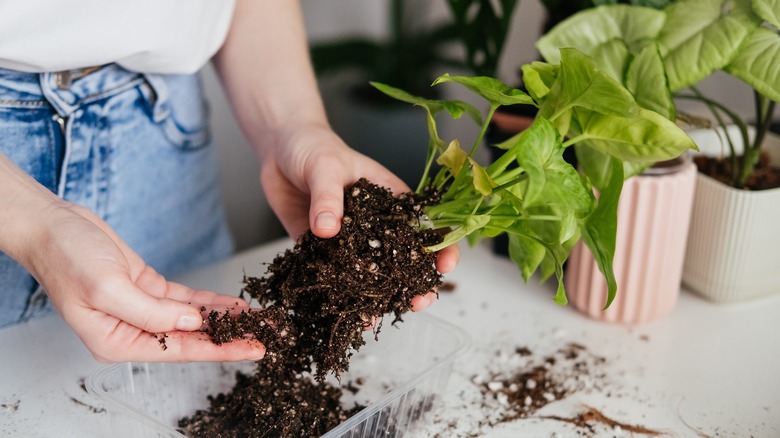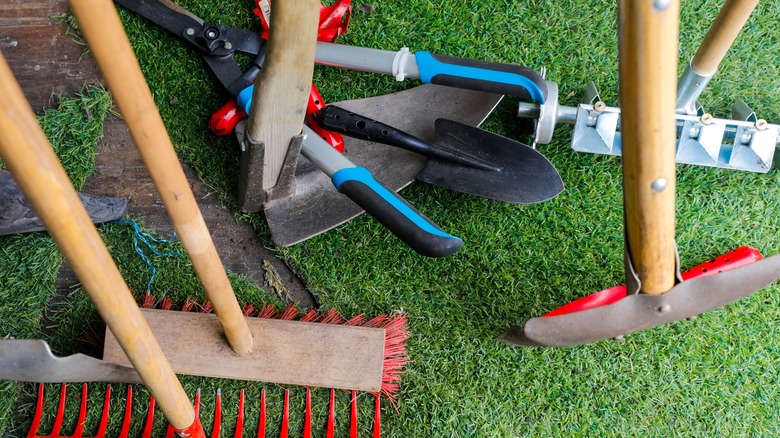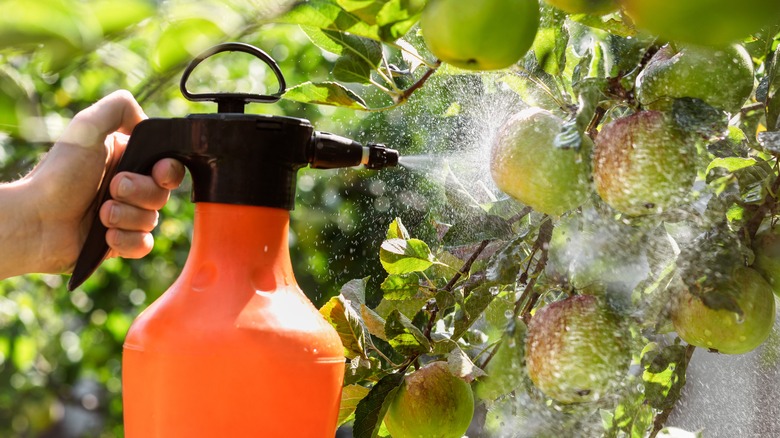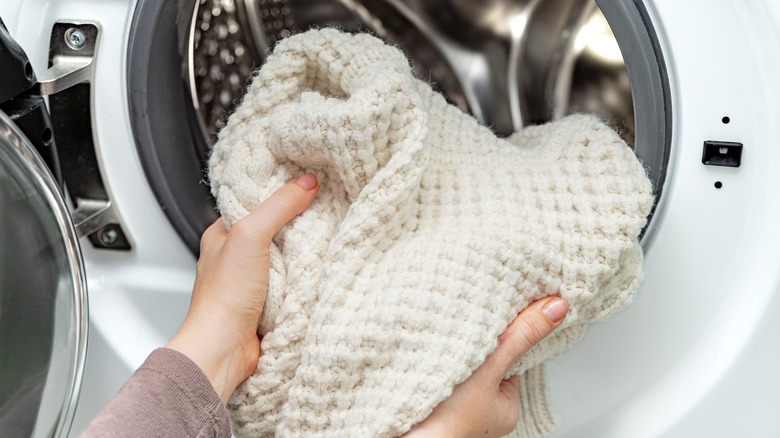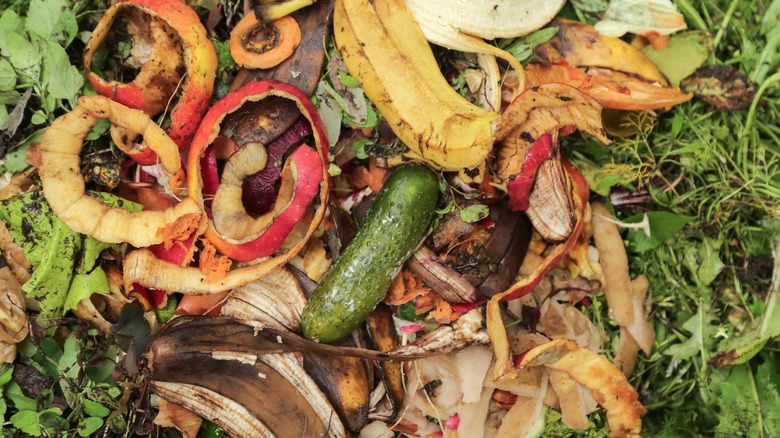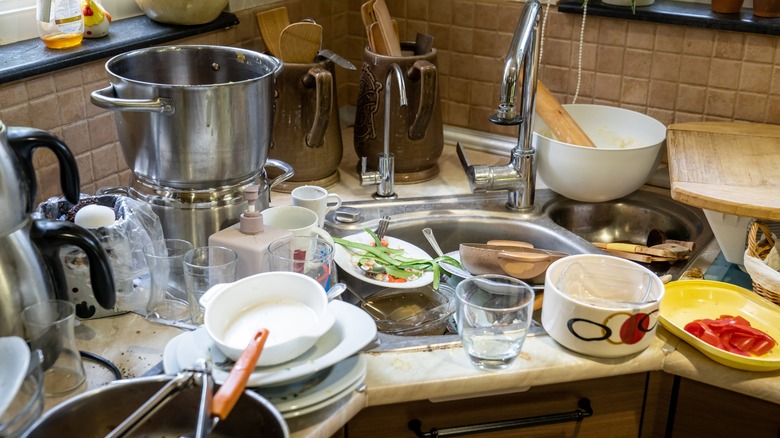Things You Should Never Do With Hydrogen Peroxide In Your Home And Garden
Hydrogen peroxide is a versatile household staple, prized for its cleaning power, disinfecting, laundry applications, and even pest control. However, there are significant pitfalls when using this common liquid. To help you navigate its proper use, we exclusively consulted lawn care experts, gardening professionals, and cleaning specialists to highlight the key mistakes to avoid when using hydrogen peroxide.
For example, you might be wondering if hydrogen peroxide can actually benefit your garden or if it could cause irreparable damage to your plants. We also explored its effectiveness in stain removal — will it help, or will you just end up with bleached spots? It turns out that while the cleaner can be incredibly useful in some areas of your home, it can also be harmful in others. Knowing the right applications will help you use this handy staple without any of the risks.
Mix it with other cleaners
Although social media is filled with videos of creators combining random cleaning products for clout, our experts warn that doing so in real life can sometimes have tragic consequences. "Combining hydrogen peroxide with other cleaning products, especially those containing chlorine bleach or vinegar, can create toxic fumes or even explosive reactions," Rocky Vuong, the founder of Calibre Cleaning and NeatBrite, tells House Digest in an exclusive interview. "Avoid mixing hydrogen peroxide with any other cleaner unless explicitly instructed by the product label."
For instance, mixing something like chlorine bleach with hydrogen peroxide creates chlorine gas — something that was used as a weapon in the trenches of World War I. So, it's definitely not something you want to have in your home. If you combine hydrogen peroxide with vinegar, it makes peracetic acid, which, while a powerful cleaning aid, is also an industrial corrosive that can harm the eyes, skin, and lungs. To avoid burning, injuring, or accidentally poisoning yourself, be wary of any chemical mixing and just stick to straight solutions.
Use it as a seed germinator
If you want your garden seeds to grow quickly and healthily, hydrogen peroxide isn't the answer. You might have seen peroxide germination hacks on TikTok or gardening blogs, but there is a lot of room for error that can wield disappointing results. "A common myth I've had to debunk is the use of hydrogen peroxide to 'boost' seed germination," Ben McInerney, a certified arborist and founder of GoTreeQuotes, tells House Digest. "While a very dilute solution can sometimes help, I've seen countless gardeners unknowingly sterilize their seeds with too-strong mixtures. It's like trying to give your seeds a refreshing drink and accidentally waterboarding them instead."
Instead, if you would like to help germinate the seeds in your garden, there are a few tricks to make it easier that don't include drowning them in chemicals. Instead, be sure to store the seeds properly before planting so they don't get damaged, and keep the germination trays covered and plenty moist. Just with plain water, not hydrogen peroxide!
Clean certain surfaces in the home
While some might swear by hydrogen peroxide as a cleaning agent, our experts warn that you might actually do more harm than good when using the substance on certain surfaces. "Marble, granite, and other natural stones can be etched or discolored by hydrogen peroxide," Vuong warns. "It's best to use a cleaner specifically designed for natural stone surfaces." If you want to keep your natural stone countertops looking their best, using this cleaner isn't the way to do it. If you don't want to use store-bought chemicals, a better DIY solution includes 75% dish soap and 25% rubbing alcohol. Simply spray the solution onto a microfiber cloth and use that to wipe the counters clean.
Yet stone isn't the only material to be wary of. "Hydrogen peroxide can strip or lighten the finish on wood furniture or floors," Vuong notes. If you want to use it to disinfect a spot and have no safer alternatives handy, make sure to test it on a small, inconspicuous spot first to see how it reacts with the wood. This can be in a corner behind the door on wooden floors, or a spot in the back of a furniture piece.
Use it to alter garden soil
While hydrogen peroxide can have its place in gardening, it won't work if you are trying to create a healthy ecosystem in your flower beds. "First off, if you're working on building rich, healthy soil full of beneficial microbes, you'll want to steer clear of hydrogen peroxide," Brad Saunders, President of Heroes Lawn Care, tells House Digest. He reasons that the liquid kills nearly everything it comes into contact with. So yes, it might kill bacteria and certain fungi that can harm your plants — but it also will kill the beneficial microbes that help your soil thrive. This isn't what you want to happen. "In the long run, using hydrogen peroxide repeatedly can decrease your soil's fertility because those beneficial microbes are essential for breaking down organic matter and enriching your soil," he explains.
Others in the gardening space are quick to agree with his warning. "Dousing your soil with hydrogen peroxide is like setting off a nuclear bomb in a microbial metropolis," McInerny adds. "I've seen entire vegetable gardens rendered unproductive for seasons after overzealous 'sterilization' with hydrogen peroxide."
Use it near runoff areas
Even gardeners who are not going out of their way to have the most eco-friendly properties should consider how the lawn treatments they use might impact their wider environment. "Another thing to consider is your garden's location," Saunders advises. "If you have runoff that could end up in a nearby stream, lake, or any natural water source, hydrogen peroxide could pose a risk to aquatic life."
Saunders also acknowledges that while the evidence for the chemical harming fish, frogs, and the like is only anecdotal, it's still something to be mindful of, just in case. "It does break down fairly quickly into water and oxygen, but you don't want to take chances with any runoff that might cause harm," he says. While the amounts running off might be negligible from a family garden, a larger farm could have a much bigger negative impact. Instead, be sure that you have useful drainage solutions at play on your property, like a well-aerated lawn, an underground catch basin, and absorbent soil.
Kill weeds with it
Those looking to kill pesky weeds in their garden without harsh chemicals might find themselves turning to hydrogen peroxide to do the job instead. Yet our experts advise that the substance can do more harm to your wallet than it ever can do to the weeds. "Yes, hydrogen peroxide can do the job, especially if you're working with higher concentrations," Saunders shares. Specifically, you can get rid of weeds with this natural liquid if you use the 10% version, and it works best on young rather than established plants. "But honestly, it's not the most practical or cost-effective method out there." Instead, you'll find yourself quickly overspending on bottle after bottle to see any results.
"If you're looking for a better alternative, vinegar — specifically at 30% strength — is a much cheaper and more accessible option," Saunders said. "Plus, it breaks down into safe compounds, so you're not leaving anything harmful behind." This way, you can still avoid using harsh herbicides in your yard without the risk of accidentally poisoning your plants or overshooting your yearly gardening budget in just a month or two.
Leaving it on too long on fabrics
On occasion, the liquid can be great for removing laundry stains, yet it is quite easy to take things too far. "Since we use fabric awnings in our company, we often recommend a hydrogen peroxide mixture for cleaning," Mike Falahee, President of Marygrove Awnings, tells House Digest exclusively. "But if someone isn't careful and leaves a strong mixture for a minute too long, they may see some bleaching or fading on the awning."
Instead, Falahee has a tried and true method for getting the best results without overdoing it. "I recommend no more than a 3% solution mixed with water, leaving it on the surface for no longer than 5 minutes," he shares. "If you're cleaning any type of fabric with it, I recommend keeping it at a low solution and rinsing the item immediately to avoid any adverse effects." Other experts were quick to add another caveat: Just how important testing is. If you are cleaning clothing, upholstery, or carpets, testing it on an inconspicuous spot is essential. "It's important to dilute it properly and test it in an inconspicuous area first to avoid discoloration," Vuong shares. This way, if things go wrong, you haven't ruined the entire thing.
Using it as a cure-all for root rot
Root rot is a sometimes fatal plant condition caused by overwatering or poor drainage. The excess moisture can lead to fungal or bacterial infections in the plants' roots, as these things love to fester in the wetness. You might notice yellowing leaves, stunted growth, and drooping as symptoms of the affliction. If left untreated, it can lead to the plant's death by disrupting nutrient and water uptake. Yet you shouldn't always reach for hydrogen peroxide to fix things. "One of the most common mistakes I've seen is gardeners using hydrogen peroxide as a cure-all for root rot," McInerney shares. "While it can be effective in small doses, overuse can be catastrophic. I once had a client in Brisbane who, in an attempt to save her prized orchids, drenched the roots in undiluted hydrogen peroxide. The result? A collection of very clean, very dead plants."
While you can use it to help clear up symptoms, you want to use a carefully diluted solution and avoid using it on certain plants. "Hydrogen peroxide is very effective in order to treat fungal infections and root rot," Matthew Wilson, gardening Expert at Handy Gardeners, tells House Digest. "However, when it comes to seedlings and young plants, hydrogen peroxide is too severe. Avoid using them on such tender plants since this may lower the growth rate or may kill them outright." As for established plants, use no more than 1 tablespoon to 1 cup of water.
Disinfect gardening tools with it
In some people's minds, hydrogen peroxide is the perfect disinfectant. So it makes sense to use it to clean off their gardening tools. Yet our experts agree that while it might help clean them, there are better disinfecting options out there. "Some folks suggest using hydrogen peroxide, but the truth is, it's not the most effective choice," Saunders says. "Research has shown that a simple bleach solution — 1 part bleach to 9 parts water — does a far better job at disinfecting tools. It's more reliable, and you'll know you're getting a thorough clean."
But Saunders also understands that bleach might not be everyone's preferred cleaning solution. For some, it might be too harsh or too chemically. For these gardeners, "rubbing alcohol is another solid option," he shares. Yet if he can get one thing across, it's this: "Hydrogen peroxide just doesn't measure up when it comes to getting your tools properly disinfected."
Spraying it on plants (as it kills insects)
Good gardens have a delicate balance between making their flower beds and vegetable patches inhospitable for pests but comfortable for pollinators. However, the use of hydrogen peroxide as a pest control method requires a deep understanding of its caveats. Careless use can disrupt the natural order and harm beneficial insects. As Wilson cautions, "Hydrogen peroxide could burn helpful insects in the garden, like bees and ladybugs, if it were to be used carelessly. It must always be diluted appropriately — generally speaking, a mixture of 1 part hydrogen peroxide with 10 parts water — and applied directly into the soil without spraying on the plants."
By targeting the soil directly, you ensure you won't harm any buzzing or fluttering insects. McInerney shares a cautionary tale, "Perhaps the most heartbreaking consequence of hydrogen peroxide misuse I've witnessed was in a community garden in Melbourne. Well-meaning gardeners, attempting to combat a fungal issue, sprayed their flowering plants with a hydrogen peroxide solution. The next day, the ground was littered with dead bees and butterflies." So, it's crucial to avoid spritzing the liquid on leaves and flowers where pollinators thrive. This also means that you can't use the spray to eradicate pests that live on leaves rather than in the soil, like aphids or spider mites. For these pests, you will need to seek a different solution.
Launder things like wool or cashmere
Hydrogen peroxide is a tried-and-true stain remover, but it's not suitable for delicate fabrics like wool and cashmere. "[They are] natural fibers, and hydrogen peroxide can be too harsh for them. The peroxide can break down the protein structure of these fibers, leading to weakening or even damage over time," Prerna Jain, the operations manager of Ministry of Cleaning, tells House Digest exclusively. "Wool, in particular, is made of keratin, a protein similar to human hair, and just like you wouldn't bleach your hair without damage, the same goes for wool." Hydrogen peroxide's impact on the material can be devastating. As Jain points out, it can make fibers brittle, fray, or lose their softness. She also warns that its use may cause discoloration, especially in darker fabrics.
Washing the two fabrics doesn't have to be difficult, however. Just stick to custom-formulated options instead of branching out. "Products like wool-specific detergents are designed to clean without stripping the natural oils or damaging the fibers," she said. "Another option is to hand wash these items in cold water with mild soap, then lay them flat to dry, which helps maintain their shape and texture." Yet that is just for general cleaning. To get rid of stains, it's okay to add a touch of white vinegar to the mix, too, she says.
Adding it to your compost to speed things up
Composting is a great way to transform organic waste, like food scraps and yard clippings, into nutrient-rich soil. However, if you feel like your pile isn't turning into "black gold" quite fast enough, avoid the hack telling you to add hydrogen peroxide to it to speed things up. It doesn't work! "Never add hydrogen peroxide to your compost pile in an attempt to speed up decomposition. It might seem like a good idea to inject some extra oxygen into the mix, but you'll likely end up killing off the very microorganisms responsible for breaking down organic matter," McInerney warns. "I once saw a prize-winning compost heap turned into a slimy, odorous mess after such an experiment."
Instead, if you find that your pile isn't decomposing at a rate you like, add a touch more water to it to keep it nice and moist. You want a few droplets of water to drip if you squeeze it. Compost also likes air and new food, so adding fresh clippings daily and turning the pile with a shovel can also help speed up the process.
Use it on very dirty surfaces
If your kitchen countertops are a mess, your tablecloth has globs of tomato sauce, or your siding has mud splatters, hydrogen peroxide might not be the best solution for the problem. "A very common mistake made with hydrogen peroxide is to apply it to dirty surfaces," Andriy Neborak, founder and CEO of Luxury Cleaning NY, shares with House Digest. "It might react with the dirt and grime and stain whatever it is you are cleaning. Sometimes it might even discolor the surface."
Instead, start with plain ol' dish soap and water at the beginning of the process. Remove any dirt, messes, or grime that can stain surfaces when they become wet, ensuring you have a clean slate to work with. For example, adding peroxide on top of mud is just going to make the mud more diluted, helping to spread it around. Once the space is clear of bigger messes, that's when hydrogen peroxide can jump in.
Use it under full sun
The best time of day to water your plants is first thing in the morning. This is because it's not hot enough for the water to burn off right away, so it has plenty of time to soak into the ground and nurture the plants. However, as things warm up, the excess water will evaporate quickly. If you water in midday, the water might be gone before it can help. Water too late, and the wet sits in the ground all night and chills, which can harm the plants.
It's much the same concept for using hydrogen peroxide in your garden, too. "Never use hydrogen peroxide under full sun," Wilson warns. " It may burn leaves and stress the plants if it is applied when the day is the hottest. It should be applied during early morning or late evening, when the temperature remains cool."
